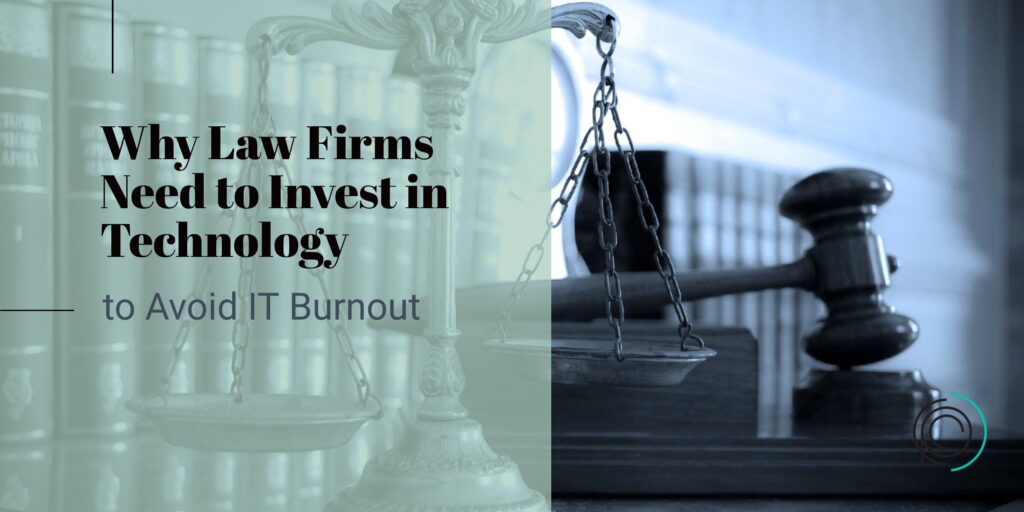Beyond Firefighting: Transforming IT to Safeguard Sensitive Data and Enhance Security
Maintaining a secure system and safeguarding valuable data has become a top priority for law firms. The daily operations of a law firm heavily rely on the security of its systems to protect sensitive information and maintain client trust. However, this task can be challenging if the IT department is constantly dealing with urgent issues and struggling to maintain outdated legacy systems. The never-ending firefighting can easily lead to IT burnout, which is a widespread problem across various industries. Unfortunately, law firms that have not made sufficient investments in technology are particularly susceptible to this issue.
To address this pressing concern, law firms need to take proactive steps to level up their cybersecurity measures. One crucial aspect involves phasing out legacy systems, which are often outdated and vulnerable to security breaches. By replacing these systems with modern, robust technologies, law firms can enhance their overall security posture. It also allows the IT department to focus on proactive measures, rather than continuously reacting to emergencies.
Empowering the IT department to take charge of securing the company’s systems and data is another essential step. With the necessary resources and authority, IT professionals can implement effective security measures, such as implementing multi-factor authentication, encrypting data, and regularly updating security patches. They can also conduct regular security audits and assessments to identify potential vulnerabilities and gaps in the system.
Investing in cybersecurity training and education for the entire staff is equally vital. Cyber threats are continually evolving, and employees need to be educated on best practices, such as recognizing phishing emails and using strong passwords. By fostering a culture of security awareness, law firms can significantly reduce the risk of security breaches caused by human error.
Law firms must prioritize cybersecurity by embracing modern technologies, phasing out legacy systems, and empowering their IT departments. By doing so, they can effectively safeguard sensitive information, mitigate the risk of cyber attacks, and ensure the smooth and secure operation of their business. Ultimately, investing in robust cybersecurity measures is not only crucial for law firms’ day-to-day operations but also for preserving their reputation and maintaining client trust in an increasingly digital world. Now let’s explore how law firms can level up their cybersecurity by phasing out legacy systems and letting IT take charge of securing your company’s systems and data.
The Risks of Legacy Systems
Sticking with familiar but outdated software and hardware systems can be tempting for many law firms. However, this choice can put your firm at risk. The main vulnerability of such systems lies in their legacy nature, which can serve as the entry point for cyber attacks. Legacy systems are often difficult to secure and maintain, and they may lack compatibility with newer technologies, making it challenging to integrate new software and keep your systems updated. Because these systems are no longer supported by manufacturers, you may encounter difficulties in finding IT support when you need it. This can leave you without adequate technical assistance when facing issues or vulnerabilities with your legacy systems.
It is important to note that relying on outdated technology can hinder your firm’s ability to keep up with current security standards. As cyber threats continue to evolve, newer technologies offer advanced security features that can better protect your sensitive data. By sticking with outdated systems, you are increasing the likelihood of data breaches, which can have severe consequences for your clients and your reputation.
To mitigate these risks, law firms must invest in modernizing their software and hardware systems. Upgrading to newer and more secure technology can improve your firm’s overall cybersecurity posture and reduce the risk of cyber-attacks. Newer systems often offer better integration capabilities, enabling smoother workflows and increased efficiency.
While transitioning to new systems may require an initial investment of time and resources, it is a necessary step to safeguard your firm against potential threats. Regularly assessing your technology infrastructure and keeping it up to date is an essential part of maintaining a strong and secure IT environment for your firm.
The Legal Industry is Especially at Risk
Cybersecurity threats pose a significant challenge to various industries, but the legal sector is undoubtedly more susceptible. Law firms have become prime targets for hackers due to their work, which involves handling highly sensitive and confidential information. These cybercriminals seek to exploit vulnerabilities within law firms, with the intention of gaining unauthorized access to valuable data such as financial records, employee details, personal client information, or even confidential agreements. Without a comprehensive and up-to-date cybersecurity plan in place, law firms are left vulnerable and at substantial risk of falling victim to damaging and disruptive data breaches. It is crucial for these firms to prioritize the implementation of robust security measures to safeguard themselves and their clients’ information from the ever-evolving landscape of cyber threats.
Investing in Cybersecurity
Investing in cybersecurity not only provides numerous benefits but also helps minimize the risk of IT burnout and safeguards your law firm from potential data breaches. To effectively achieve this, it is crucial to focus on modernizing your systems by phasing out legacy infrastructure and adopting more secure technologies. By collaborating with your IT department, you can develop a comprehensive plan that includes upgrading both software and hardware. This ensures that your investments are dedicated to advanced technologies specifically designed to combat the constantly evolving security threats present in today’s digital landscape. Embracing these proactive steps will not only protect your firm’s sensitive information but also alleviate the burden on your IT team, allowing them to work more efficiently and reducing the likelihood of system-related fatigue.
Letting IT Take Charge
In order to prevent IT burnout, it is crucial to empower the IT department to take control of managing and safeguarding your company’s systems and data. This can be done by providing them with the necessary resources and granting them the authority to implement the most up-to-date security protocols, adhere to cybersecurity best practices, and stay informed about evolving threats. By fostering collaboration with the IT team and offering them the support they require to carry out their responsibilities effectively, you can significantly diminish the likelihood of burnout while simultaneously enhancing your firm’s overall security stance. This dedication to empowering IT professionals not only promotes their well-being, but it also contributes to the overall success and resilience of the organization in the face of potential risks.
Partnering with Third-Party Providers
Finally, partnering with third-party providers can also be an effective way to level up your cybersecurity efforts without overburdening your IT staff. By working with a trusted provider, you can outsource some of the IT tasks needed to protect your firm’s data without placing an overwhelming burden on your IT team. From email security to cloud solutions, many providers specialize in delivering IT solutions tailored to the unique needs of law firms.
Investing in technology is a crucial undertaking for every law firm, as it plays a pivotal role in ensuring overall security. With the rapid evolution of technology, law firms must constantly update their systems and processes to keep up with the ever-evolving cyber threats. Adopting advanced technology not only improves security but also helps prevent IT burnout – a pervasive issue faced by many firms.
One approach to enhancing cybersecurity is by phasing out legacy systems that may have vulnerabilities and replacing them with more secure and modern solutions. Legacy systems are often outdated and lack the necessary security features to withstand sophisticated cyber attacks. By investing in newer technologies, law firms can greatly reduce the risk of data breaches and other security incidents. Additionally, empowering the IT department to lead in this endeavor is critical. Giving them the authority and resources to implement new security measures and protocols will enable the firm to stay ahead of potential threats.
Furthermore, shadow IT not only presents a significant challenge but also adds an additional layer of risk to an organization’s security. Shadow IT refers to the use of unauthorized or unapproved software, applications, or devices within a company. It often occurs when employees seek to streamline and improve their work processes by utilizing third-party applications without the knowledge or consent of their IT department. While their intentions may be good and focused on efficiency, the use of such applications can expose an organization to potential security breaches and vulnerabilities.
By bypassing official IT channels, employees may unknowingly introduce software with weak encryption protocols or vulnerabilities that malicious actors can exploit. These unauthorized applications may lack the necessary security features or regular updates that would protect sensitive data or prevent unauthorized access. Moreover, as these applications are not subject to organization-wide security policies and controls, they can undermine the overall security infrastructure in place.
The use of shadow IT complicates the management of IT assets and data within an organization. The IT department may struggle to identify and monitor all the different applications being used, making it difficult to effectively protect and manage the organization’s data. This lack of visibility also makes it challenging to enforce compliance with regulatory requirements and industry standards, further jeopardizing the overall security posture of the organization.
Moreover, shadow IT also hinders the organization’s ability to ensure data privacy and confidentiality. When unauthorized applications are used, data may be stored or processed outside of the organization’s approved systems or servers. This increases the risk of data breaches, leaks, or unauthorized access to sensitive information. Additionally, the uncontrolled use of third-party applications may lead to data fragmentation or duplication, making it harder to maintain data integrity and accuracy.
To mitigate the risks associated with shadow IT, organizations need to foster a culture of transparency and collaboration. Clear communication channels should be established between employees and the IT department to educate and inform them about the potential risks and consequences of using unauthorized applications. Additionally, investing in robust security solutions, regularly monitoring network traffic, and conducting thorough risk assessments can help detect and prevent the use of shadow IT within the organization.
Overall, while the use of third-party applications may seem beneficial in streamlining manual processes, organizations must recognize the dangers posed by shadow IT and take proactive measures to protect their security and data integrity. By addressing these risks head-on, organizations can ensure a more secure and resilient IT environment for the entire organization.
However, law firms should also recognize the importance of collaborating with third-party providers who specialize in cybersecurity. Outsourcing certain aspects of security management to these experts can further alleviate the burden on the internal IT department. Third-party providers often have the expertise and resources necessary to effectively monitor and protect the firm’s data, complementing the efforts made by the in-house team.
In conclusion, law firms that prioritize investing in technology and implementing comprehensive security strategies can proactively safeguard their valuable data and mitigate the risk of cyber-attacks. By phasing out legacy systems, empowering the IT department, and leveraging the expertise of third-party providers, firms can effectively enhance their overall cybersecurity posture while reducing the strain on their internal IT resources. Ultimately, this proactive approach ensures the firm can focus on its core operations without the constant fear of cybersecurity threats and IT burnout.
We specialize in operational efficiency, phasing out legacy systems, and driving employee engagement at every level. If you would like to discuss how we can help you avoid a cyber-attack, book a no-obligation consultation with one of our experts today.
Remember, technology is your partner in the race against technological risks!






